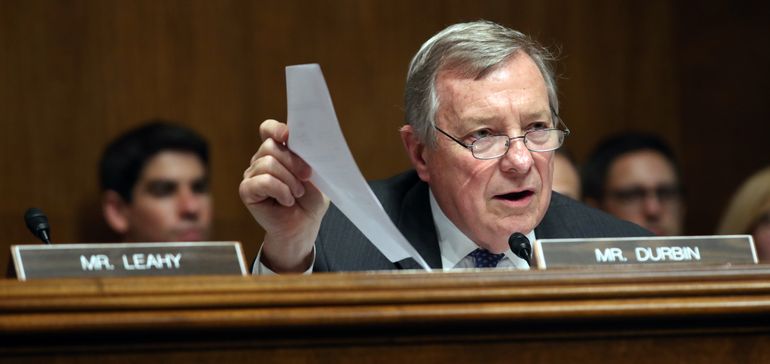|
Getting your Trinity Audio player ready...
|
The Credit Card Competition Act proposed by Sen. Dick Durbin failed to pass before the congressional session ended last month, but he plans to keep pushing ahead with the bill.
Durbin (D-IL) plans to reintroduce the bill in the new 118th congressional session that began this year, said Emily Hampsten, a spokesperson for his office. There’s no date for that at the moment, Hampsten said, but it’s unlikely to be this month, given senators won’t return to business until Jan. 23.
The bill, which failed to pass in the last session, mandated that merchants have access to card networks other than Visa and Mastercard for routing credit card transactions. In 2010, Durbin successfully won passage of an amendment to the Dodd-Frank Wall Street Reform and Consumer Protection Act that imposed a similar requirement on debit transactions.
The Democratic senator from Illinois has been determined to inject competition into an industry dominated by Visa and Mastercard. In the final weeks of the congressional session last year, he angled to attach the bill to a defense or omnibus funding legislation, but those paths to passage weren’t open.
Durbin, who has battled for years to rein in what he calls the Visa-Mastercard duopoly, landed Kansas Sen. Roger Marshall as a Republican co-sponsor of the bill, and a House companion bill also had bipartisan sponsorship.
Now that Republicans control the U.S. House, professionals who have watched Durbin’s crusade say it will likely be tough to pass the legislation in this new term, which runs through 2024.
That was the opinion of Lloyd Constantine, a New York antitrust attorney who has battled the card companies in court for years. While he believes the new Congress could create some “strange coalitions,” it’s more likely Durbin will have to wait for Democratic control of the House before he’s able to push legislation through, Constantine said.
That’s also the perspective of a group representing the card companies. “Politically, it faces an uphill battle,” said Scott Talbott, a spokesperson for the Washington-based Electronic Transactions Association. “This is especially true with the divided Congress.”
Despite ETA’s membership, including some 500 corporate and organization members as well as credit card companies such as Visa and Mastercard, it didn’t take as active a role battling the legislation as did the Electronic Payments Coalition.
“The misguided Credit Card Competition Act was deeply unpopular legislation among both Democrats and Republicans because it would have harmed consumers through higher costs, weakened payment security, harmed small financial institutions, and reduced access to credit for those who need it the most,” the EPC’s chairman, Jeff Tassey, said in a statement.
The Senate bill didn’t win significant legislative support last year, and never received a committee hearing after being introduced in July. The same was true for the House bill introduced in September sponsored by Reps. Peter Welch (D-VT) and Lance Gooden (R-TX).
Gooden was re-elected to the House, but Welch won a seat in the Senate so backers of the bill will need to find a new Democratic House sponsor, though that shouldn’t be a difficult task, given Democratic President Joe Biden’s antitrust mission.
Meanwhile, the National Retail Federation and Merchants Payments Coalition that supported the legislation, arguing it would reduce rising card interchange fees, remain committed to passing the bill, MPC Executive Committee member Doug Kantor said in a statement.
“Momentum is building and we fully expect Congress to take action to address out-of-control credit card swipe fees this year,” said Kantor, who is also general counsel at the National Association of Convenience Stores. “Competition is key to bringing these fees under control and this legislation will make the card industry compete the same as other businesses do every day.”



